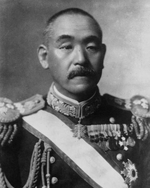Kantaro Suzuki
| Surname | Suzuki |
| Given Name | Kantaro |
| Born | 24 Dec 1867 |
| Died | 17 Apr 1948 |
| Country | Japan |
| Category | Government |
| Gender | Male |
Contributor: C. Peter Chen
ww2dbaseKantaro Suzuki was born in Sakai, Osaka Prefecture, Japan, and grew up in the city of Noda, Chiba Prefecture. He entered the Naval College in 1884 and joined the Imperial Japanese Navy in 1888. He was immediately shipped off to serve in the First Sino-Japanese War as a torpedo boat captain. During the Russo-Japanese War, he was the commander of the 4th Destroyer Division and participated in the Battle of Tsushima. During WW1, he was the Vice Minister of the Navy. He achieved the rank of full admiral in 1923, and later in the 1920s became the commander-in-chief of the Combined Fleet. On 26 Feb 1936, he narrowly escaped assassination; the bullet that intended to kill him remained in his body for the remainder of his life. He retired from the navy in 1937 and was an important advisor to the Japanese government.
ww2dbaseIn 1944, Suzuki became the chairman of the Imperial Advisory Council. Strongly opposed to continuing the Pacific War, he urged his colleagues to negotiations with the Americans as soon as possible. In Apr 1945, Suzuki was named the 42nd Prime Minister of Japan at the age of 77. As Prime Minister, he continued to lobby for negotiations, making him an unpopular person amongst militarists, and several more assassination attempts would follow. After Emperor Showa's radio address that announced the intention of surrender, he resigned his post, but continued to be a close advisor to Emperor Showa. On 15 Aug 1945, newspaper Mainichi Shimbun published a story written by Suzuki on the Japanese surrender. In the article he wrote that it was his conviction to "trust the enemy commander." "The 'Bushido' is not a Japanese monopoly", he said. "It is an universal code." He believed that Allied commander Douglas MacArthur was a warrior who abided by the rules of Bushido, therefore he would "protect [his] adversary who has surrendered as one enlisted on [his] side". Shigeru Yoshida, Japan's 45th Prime Minister (1946-1947) noted Suzuki's article not only expressed his personal views, but also that of Emperor Showa. Suzuki's sincere cooperation with the occupation forces helped ease the transition significantly.
ww2dbaseSuzuki died of natural causes in 1948.
ww2dbaseSources: Reminiscences, Wikipedia.
Last Major Revision: Aug 2006
Kantaro Suzuki Interactive Map
Photographs
 |  |
Kantaro Suzuki Timeline
| 24 Dec 1867 | Kantaro Suzuki was born in Kuze, Izumi Prefecture, Japan. |
| 7 Apr 1945 | Kantaro Suzuki was named the 42nd Prime Minister of Japan. |
| 3 May 1945 | Japanese Prime Minister Suzuki maintained "faith in certain victory" in a public statement despite Germany defeat. |
| 9 Jun 1945 | Japanese Prime Minister Kantaro Suzuki announced publicly that Japan would fight on rather than accept unconditional surrender. |
| 17 Apr 1948 | Kantaro Suzuki passed away. |
Did you enjoy this article or find this article helpful? If so, please consider supporting us on Patreon. Even $1 per month will go a long way! Thank you. Share this article with your friends: Stay updated with WW2DB: |
Visitor Submitted Comments
All visitor submitted comments are opinions of those making the submissions and do not reflect views of WW2DB.
» Kasuga
- » 1,150 biographies
- » 337 events
- » 43,917 timeline entries
- » 1,241 ships
- » 350 aircraft models
- » 207 vehicle models
- » 375 weapon models
- » 123 historical documents
- » 260 facilities
- » 470 book reviews
- » 28,547 photos
- » 432 maps
Chiang Kaishek, 31 Jul 1937
25 May 2016 02:16:08 AM
The New York Times 16th April 1945.
‚ÄėJapanese Premier Voices ‚ÄėSympathy‚Äô.
‚Äú I must admit that Roosevelt‚Äôs leadership has been very effective, and has been responsible for the American‚Äôs advantageous position today. For that reason I can easily understand the great loss his passing means to the American people, and my profound sympathy goes to them ‚ÄĚ.
Suzuki Kantaro.